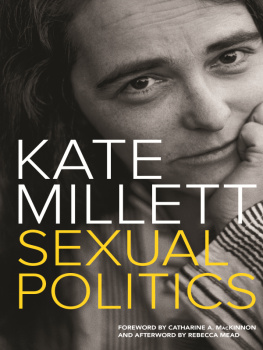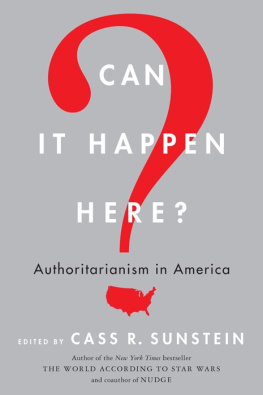SEXUAL POLITICS
SEXUAL POLITICS
KATE MILLETT
FOREWORD BY Catharine A. MacKinnon AFTERWORD BY Rebecca Mead
COLUMBIA UNIVERSITY PRESS
New York
Columbia University Press
Publishers Since 1893
New York Chichester, West Sussex
cup.columbia.edu
Copyright 1969, 1970, 1990, 2000, 2016 Kate Millett
Foreword 2016 Catharine A. MacKinnon
All rights reserved
E-ISBN 978-0-231-54172-5
ISBN 978-0-231-17424-4 (cloth : alk. paper)
ISBN 978-0-231-17425-1 (pbk. : alk. paper)
ISBN 978-0-231-54172-5 (e-book)
Library of Congress Control Number : 2015943286
A Columbia University Press E-book.
CUP would be pleased to hear about your reading experience with this e-book at .
Cover design: Rebecca Lown
Cover image: Cynthia MacAdams/The LIFE Images Collection/Getty Images
References to websites (URLs) were accurate at the time of writing. Neither the author nor Columbia University Press is responsible for URLs that may have expired or changed since the manuscript was prepared.
CONTENTS
CATHARINE A. MACKINNON
It is of the nature of idea to be communicated: written, spoken, done. The idea is like grass. It craves light, likes crowds, thrives on crossbreeding, grows better for being stepped on.
Ursula LeGuin, The Dispossessed
Sexual Politics originated an idea that has been a wellspring of the movement of women it defined and inspired, one that remains so prescient that it is still aheadeven far aheadof most thinking and action to this day. First published in 1969, the book initiated the filling of one of the most urgent needs of our time: a cogent, coherent, accurate, compelling theory of male power first over women and then over lesser men (269). Sex is deep at the heart of our troubles, Kate Millett wrote then, and unless we eliminate the most pernicious of our systems of oppression, unless we go to the very center of the sexual politic and its sick delirium of power and violence, all our efforts at liberation will only land us again in the same primordial stews (22). This was new. How right she was, we know now more than anyone could have then.
In this book, Kate initiated the analysis that the sexualization of power is the basis of oppression. She observes and trenchantly dissects its deployment across time, space, and culture, and insists with humor but without apology on the liberation of everyone from it. She argues not only that a realpolitik exists that is sexual in nature, but that politics itself, properly understood, is sexual at its core. Defining the political as being about power-structured relationships, she contends, drawing on an array of compelling examples from literature and history, that heterosexual coitus is a model of sexual politics on an individual or personal plane (23), producing sex [as]a status category with political implications (24). Speaking of Jean Genet, who treats gay as well as straight sexual relations, her reading of his play The Balcony finds him exposing the fundamental human connection, that of sexuality, to be the nuclear model of all the more elaborate social constructs growing out of it,in itself not only hopelessly tainted but the very prototype of institutionalized inequality (20). Genets play is set in a brothel. Inequality, institutionalized, is what its relations are seen to manifest. Unless the clinging to male supremacy as a birthright is finally foregone, Kate argues in that context, all systems of oppression will continue to function simply by virtue of their logical and emotional mandate in the primary human situation, sexuality being that situation (21).
In her analysis, as well as that of the womens movement that followed, sexuality is socially, not naturally, constructed and driven; it is a gendered relation in social space, not an internal essence or biological drive. Social roles, gender-based temperaments, and sexual scripts produce and reproduce the sexual domination of men over women and other men. Far from being inherent or biologically inevitable, masculinity and femininity, Kate states in her critique of Freud, are elaborate behavioral constructs for each sex within society, obviously cultural and subject to endless cross-cultural variation (19091). These constructs engender widespread conformity to social norms that are widely but falsely believed to be based on male and female anatomy. Sex roles create a patriarchal character structure that becomes a habit of mind and a way of life (63). Consent to subordinate status by women and subordinate men is obtained through conditioning to ideology through socialization (26), resulting in interior colonization (25).
Not shy about identifying sex, so organized, as primary in hierarchically structuring politics and culture, Kate contends that the primary social and political distinctions are not even those based on wealth or rank but those based on sex (65). Genet shows how the cage of sex is the cage in which all others are enclosed (22). With sexuality its fundamental dynamic, the family is identified as male supremacys primary institution, its internal elevation of men over women and younger men, expanding outward to pervade social life. The term patriarchy in her hands thus offers a family-centered theory of male power that begins in the male-headed household and ends in society, the phallic state (22), and the international order.
The link between the family as a male-dominant institution and male-dominant sexuality as the deus ex machina of male power across society, the relation between the family and male power, the connection between heterosexual coitus and its thingified institutional arrangement in the family, is variously described. Heterosexual coitus is a charged microcosm of the variety of attitudes and values to which culture subscribes, a model of sexual politics on an individual or personal plane, the transition from intimacy to the wider context acknowledged as a great step indeed (23). How we know it starts in the family and how it gets from in here to out there are illustrated more than demonstrated: Having established its doctrine of female subjection [in bed,] Kate notes in discussing the work of Freudian Helene Deutsch, [the counterrevolution] confidently applied it to the rest of life (206). Counterrevolution being her term for male supremacy, including prior to any revolution against it, it might be noted that in bed is hardly confined to the family. In fact, not one of the powerful examples of sexual politics that open the book occurs in a family setting. Only onein which the wife is killed as foreplay to raping the mistressis even connected to familial relations. Could it be that sexuality doesnt originate in any one place and go from there to others but, under male dominance, is always present everywhere?
Ample evidence for Kate Milletts critique of sexuality as eroticized power has emerged worldwide in the form of data on rape, domestic violence, and sexual harassment.
What would it take to achieve the revolution she envisioned, and where are we on that path? First, the negative aura around sexuality would evaporate, together with the double standard and prostitution which, with the latters inhumanities, would necessarily be eliminated (62). The ideology of male supremacy and the traditional socialization by which it is upheld in matters of status, role, and temperament would then end as well, integrating separate sexual subcultures. The goal of revolution would be a permissive single standard of sexual freedom, and one uncorrupted by the crass and exploitive economic bases of traditional sexual alliances. That we can ask what a single standard of sexual freedom might mean, what its content might be, and inquire into its relation to pervasive sexual forcewhich she did explicitly discuss (6364) but later said in retrospect she wished she had emphasized moreis testament to the insight of this pioneering mind.










